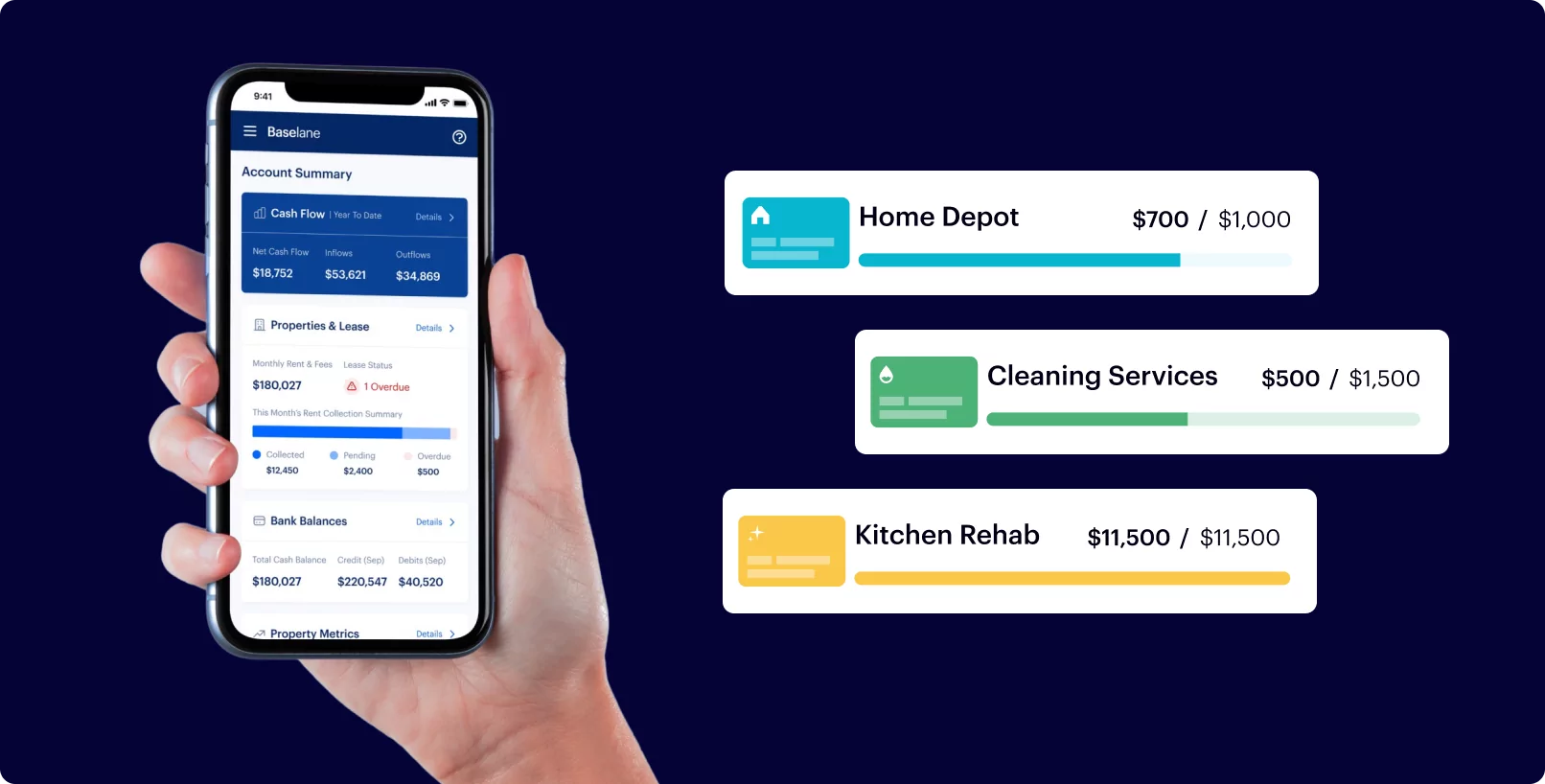

Running credit and background checks are essential to reduce the risk of non-payment. However, sometimes requiring a cosigner to a lease is necessary to protect your investment. In this article, we’ll guide you through what a cosigner is, when to require a cosigner, and how to add a cosigner to a lease agreement.
A cosigner is someone who steps in to help an applicant who doesn’t financially qualify for a rental property on their own. When a cosigner signs the lease agreement, they legally accept the responsibility of paying rent if the tenant is unable to do so. This includes subleasing in some states. If a tenant subleases an apartment in New York, the cosigner agreement remains the same. Consider a cosigner as a welcomed teammate (for a tenant and landlord) to tag in and assist financially.
See what Baselane can do for you.Automated and free Rent Collection, without the stress
A cosigner can be anyone over the age of 18 with adequate income and credit history to qualify for a rental property lease. Since cosigners are accountable for unpaid rent , most tenants choose family members. Requirements for a qualified cosigner will vary based on state laws; for example, cosigners in New York must have a credit score of at least 700, an annual income of up to 80 times the monthly rent, and live in the tri-state area.
In general, cosigner requirements often include:
Alternatively, a tenant may use a cosigning company. The cosigning company will guarantee the lease for a fee even if the tenant’s income or credit history is not ideal. However, some companies only guarantee coverage of a specific portion of the lease, leaving the tenant on the hook for the remainder.
Most landlords have a tenant screening process to ensure they select the best possible tenant. But the following types of tenants may have a hard time getting approved without a cosigner.
Low Income : Landlords look for a good income-to-rent ratio to know tenants can afford the rental. Tenants usually need to make at least two and half times the monthly rent to be considered a good applicant.
Poor Credit : A credit score below 620 is considered low, while a score above 700 is considered excellent. Landlords might consider a cosigner for tenants with bad credit.
No Credit : Prospective tenants with zero credit could be unreliable because they don’t have a history of paying debts. Utilizing a cosigner can minimize the risk.
Eviction History : A tenant with a record of non-payment or breaches of a lease agreement is a red flag for landlords. To even consider renting, a responsible cosigner should also sign the lease.
No Rental History : If renting to students, landlords might face potential tenants with no rental history. Adding a cosigner to the lease to vouch for the tenant is a must.
Automated and free Rent Collection, without the stressAutomated and free Rent Collection, without the stress
When adding a cosigner for an apartment, it’s highly recommended they sign an agreement. Making sure the terms and conditions are clear before leasing a property will avoid any misunderstandings later. Adding a cosigner is pretty straightforward with these steps:
Credit scores only show someone’s history – that’s it. If you’re renting to college students or someone who is self-employed, adding a cosigner can be a further risk reduction tool with some additional benefits like:
Landlords aren’t legally obliged to accept a cosigner. If you move forward with a cosigner, the Fair Housing Act protects them the same way it does a tenant. They must be approved or denied without bias. Consider the following when deciding on an application that requires a cosigner:
A cosigner is someone who jointly signs a lease to guarantee payment. Allowing a cosigner on a lease agreement is an extra layer of protection for rental income. A cosigner on a lease takes financial responsibility for paying rent or other charges related to the property if the tenant fails to pay.
Who needs a cosigner in real estate?If a potential tenant does not meet the standard requirements during the rental screening process, consider adding a cosigner. A bad credit score, lack of steady employment history, or a first apartment rental are all examples of tenants who may require a cosigner.
Are there risks to having a cosigner?Having a cosigner doesn’t automatically mean payment will be made if the tenant defaults, nor does it mean they will be the perfect tenant. There could be situations where you have to chase down both parties to collect rent. We recommend setting up online rent payments with automatic payment reminders to keep tenants on track.
Saad started his career as a Certified Public Accountant (CPA) working for a top-tier accounting firm. He was responsible for helping audit alternative investment funds. He later worked at a hedge fund where he was responsible for preparing financial statements and implementing new technology. He also ran a successful private tax practice for five years. After completing his MBA at Duke, Saad joined The Boston Consulting Group to do management consulting. At BCG his experience spanned several industries and growth projects across Pharma, Retail, and Technology companies. His passion for democratizing finances led him to Plaid, a fintech, where he worked with large Banks and Financial Institutions to make finances and money easier for all.
Link Copied! in this article: Related Articles:



Free Texas Lease Agreement Baselane offers free Lease Agreements for Texas, powered by Rocket Lawyer. Click here to…

When it comes to collecting rent, you can accept cash, checks, direct deposits, or use online rent collection…

Getting new tenants is a pressure-packed time for landlords. There are dozens of things that need to be…
90 Fifth Ave, Floor 10, New York, NY 10011
For support & inquiries For a guaranteed and prompt response: Or email us at support@baselane.com For urgent inquiries: Call us at: +1 (888) 586-1618 Mon-Fri 9AM-4PM EST© 2024, Skylight Financial Services Inc. (Baselane). All Rights Reserved.
Baselane is a financial technology company and is not a bank. Banking services provided by Thread Bank, Member FDIC. FDIC insurance is available for funds on deposit through Thread Bank, Member FDIC. The Baselane Visa Debit Card is issued by Thread Bank, pursuant to a license from Visa U.S.A. Inc. and may be used everywhere Visa is accepted.
1 Your deposits qualify for up to $3,000,000 in FDIC insurance coverage when placed at program banks in the Thread Bank deposit sweep program. Your deposits at each program bank become eligible for FDIC insurance up to $250,000 , inclusive of any other deposits you may already hold at the bank in the same ownership capacity. You can access the terms and conditions of the sweep program at https://go.thread.bank/sweepdisclosure and a list of program banks at https://go.thread.bank/programbanks. Please contact customerservice@thread.bank with questions on the sweep program.
2 The Annual Percentage Yield (APY) on your Savings Account is accurate as of 04/05/23. Total balances across Checking Accounts and Savings Accounts are used to calculate APY tier, but only money in Savings Accounts is eligible for interest. Total balances less than $10,000 earn 1.75% APY for Savings Accounts. Total balances between $10,000 and $24,999 earn 2.64% APY for Savings Accounts. Total Balances between $25,000 and $49,999 earn 3.06% APY for Savings Accounts. Total balances of $50,000 or more earn 3.77% APY for Savings Account. These are variable rates and are subject to change based on the target range of the Federal Funds rate. There are no minimum balances or minimum deposits required to earn interest on your Savings Account. Review the Baselane Business Deposit Account Agreement for more information.
3 Cash back is credited once per month for all rewards above 1% and credited to your account with a maximum of $2,000 annual spend per calendar year. 1% cash back is credited instantly following purchase with no maximum spend. No minimum spend applies. Terms and conditions apply.
4 Some states require an interest-bearing escrow account for security deposits while some don’t require interest. User is responsible to check state laws along with rules for collecting and reimbursing a refundable security deposit. A brief overview of security deposit laws for escrow accounts in all 50 states can be found here.
*All testimonials, reviews, opinions or case studies presented on our website may not be indicative of all customers. Results may vary and customers agree to proceed at their own risk.